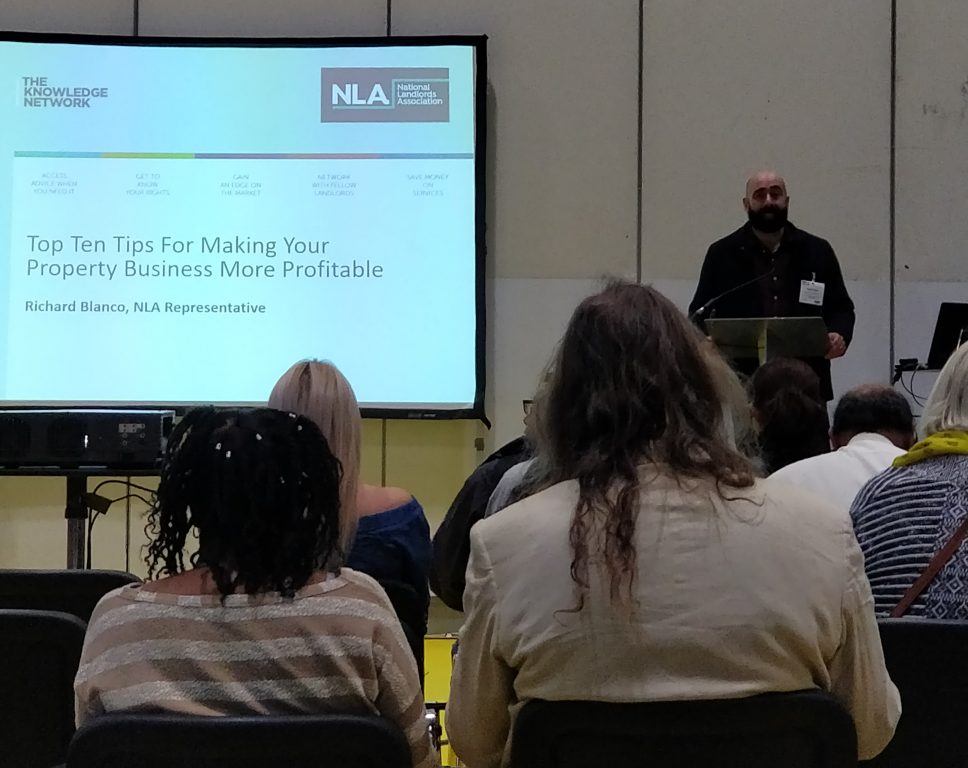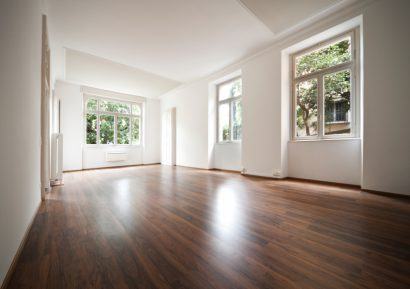Last month, we attended a fantastic talk by the charming Richard Blanco at the Property Investor Show at the London ExCel.
Blanco, being both a private landlord himself and a London Representative for the National Landlords Association (NLA), has a heap of knowledge and experience to share with his fellow investors.
Before giving his top ten tips for making your property business more profitable, he looked at the drivers for increasing profitability during somewhat difficult times. These were:
Section 24 tax changes – As many of you will know, the Government is phasing out mortgage interest tax relief over four years, starting with the tax year just gone. We are now in the second year of the reduction, which will see tax relief on landlords’ finance costs restricted to the basic rate of Income Tax (20%). This could create higher tax bills for some investors, so it’s essential that you keep your profits up.
Interest rates – It was expected that the Bank of England (BoE) would raise the base rate this month, but some doubt was cast on that and, as expected, the Bank voted to keep the base rate at 0.5% earlier in the month. However, it’s likely that the base rate will rise over the next two years, which would increase finance costs. At present, we are still in a low mortgage rate environment.
Prudential Regulation Authority (PRA) changes – Harsher stress tests have been introduced for landlords, meaning that the rental coverage must be 145% of their mortgage payment, at a rate of 5.5%. This means that landlords must receive more rent, have higher rental yields and, therefore, invest in the right types of properties for the most suitable tenants.
Brexit uncertainty – Rent prices have risen by just 0.1% in London over the 12 months to March this year, meaning that rents are now levelling off. Landlords therefore have to reduce their costs. London house prices have also dropped by 3.2% in the year to the first quarter (Q1), signalling that landlords cannot rely on capital growth so heavily. Savills is predicting 7% growth over the next five years.
After setting out why landlords should be thinking about how to make their property businesses more profitable, Blanco kicked off his top tips:
- Set rigorous criteria
Blanco began by insisting that landlords must have a clear business plan, ensuring that they buy at the right price. However, it’s good news for anyone thinking of purchasing in London, as Blanco pointed out that it’s currently a buyer’s market. Auctions are also experiencing low bids, causing pressure for vendors to bring their prices down.
Blanco encouraged landlords to set a minimum figure for their rental yield before choosing the right kind of property. Alternatively, you could choose the type of tenant that you wish to let to first, then find a property that would suit them. When seeking this ideal investment, Blanco emphasised the importance of setting a “really clear criteria”, thinking about good transport links and whether you could renovate a room into an extra bedroom if needed.
He also spoke of having a clear vision regarding whether you’re chasing capital growth or cash flow. He believes that it’s wise to have a good balance, pointing out areas with particularly strong capital growth (London and the South East) and locations with high rental yields (east London and the North West).
He looked into which type of tenant may be most profitable, explaining that Houses in Multiple Occupation (HMOs) often provide greater yields, but cost more in management fees and licensing. He noted how students can be reliable renters, but you must be prepared for nine-month tenancies between September to June with a lag in the summer, which can counteract the higher income you may earn from this type of tenant. If you’re thinking of letting to young professionals, you can seek a reasonable, standard property, whereas short-term lets will generally require higher spec homes, while those investing in Airbnb/serviced accommodation must take purchasing bed linen and towels into account.
Blanco also informed landlords to be wary of new build and leasehold properties. With new builds, you will often pay a premium price that you can’t add value to, and this type of home can be vulnerable in a falling market. Period properties, on the other hand, usually hold their value, he explained. If you’re considering a leasehold property, you must be aware of management fees and service charges, while communal areas can often be “grotty”, which Blanco believes could put off prospective tenants.
- Get organised
“I’m surprised how many people are disorganised when running property businesses,” Blanco exclaimed.
He insisted that investors must have a separate bank account for mortgages and rent money, while maintaining an emergency fund for repairs, and putting in robust systems and policies. He had some simple steps to take in order to help landlords avoid wasting their time:
- Respond to requests from tenants quickly
- Have good filing systems
- Keep a photo inventory
- Put in policies on swapping tenants and what to do if they have difficulties paying the rent
- Give tenants a tenancy handbook – “This sets things up more professionally, which should make the tenant respond as a professional customer,” Blanco believes
He noted that being disorganised could be costly; if you can supply your account details quickly to a mortgage lender then you are proving yourself to be a reliable borrower, for example.
- Manage your mortgages
Blanco reminded investors to plan ahead for product switching or remortgaging by compiling a list of all of your current products and noting when they’re going to end. He advises you to contact your lender two months before the product ends and shop around.
“Snap up good fixes before rates go up,” he urged.
Blanco suggested using sourcing systems, which throw up all of the mortgages that fit your criteria. This way, you have done your research before going to brokers – however, he did encourage landlords to use brokers for complicated circumstances.
- Stay on top of maintenance
Blanco pointed out that, if you leave issues to get worse, they get costlier, so it’s worth encouraging your tenants to report any problems to you and send photos, which enables you to “triage the repair”.
He also insisted that it’s vital that you get the right team in place, such as builders, plumbers, an electrician and pest control. You should look at the price, quality and reliability, although Blanco admitted that it’s difficult to find all three. However, you must implement a good communication system and not be too penny pitching on repairs.
Blanco looked into how you can put a maintenance strategy in place:
- Look for low maintenance solutions
- Be proactive around management – put in improvements before a disaster occurs
- Connect your maintenance up with opportunities to sell and make a profit
- Upgrade your appliances every five years
- Remember the importance of personal contact with your maintenance team – a landlord’s intervention can sometimes move a repair on
- Manage rent arrears

Top Ten Tips for Making your Property Business more Profitable
Blanco was shocked that landlords allow rent arrears to get so high. He insisted that you must manage arrears firmly, while getting the right tenant through thorough referencing in the first place is essential.
He went through what to do if a standing order fails:
- Ensure a measure of flexibility
- Chase payments after three days
- After ten days, your tenant is officially in arrears
- Try to get the rent paid within the first half of the month at least
- Set a review date and follow up
- If, after ten days, the tenant doesn’t do anything about it, you should start thinking about the legal process
- Try to negotiate with your tenant and consider moving on if they can’t pay in the future
- Help them apply for housing benefit if needs be
- Avoid the void
At present, it’s difficult for landlords to get tenants in London, so it’s essential that you make sure your property is ready. If your property is located in an area with high tenant demand, you must deal with end of tenancies “very tightly”, Blanco insisted. On a 12-month tenancy, he had the following tips:
- Month nine – ask your tenants what their plans are
- Month ten – confirm their plans
- Month 11 – start viewings with potential tenants, issue a check-out letter or meeting with your current tenants, make sure they know what to do before they move out, which day and time to leave, and how to get their deposit back, and urge them to send the keys to your agent straightaway
If the property is empty when a tenant moves out, it’s a good chance to take new pictures and complete any works that need doing. You may also need to be flexible on furniture and your rent price, as tenants can be very picky these days!
- Cut out the middle man (or woman)
If you decide to move away from using a letting agent, then you need to have your business in order. You will need to manage the following:
- Making sure your tenant is okay
- The check-in process
- Managing the tenancy and property
- The check-out process
It can be done, Blanco explained, but you may need online services to help you. He advises using an inventory firm and, of course, protecting your tenant’s deposit in one of the three Government-approved schemes.
“Letting without an agent forces you to be on top of the legislation, and there are quite a lot of savings,” he pointed out.
Looking at a property with a £2,000 monthly rent, an average 14% management fee would cost you £3,360 per year, while an 8% let-only fee would cost £1,920 each year.
“Having a direct connection with your tenant is so valuable; they respect your property more, stay longer and appreciate the contact,” Blanco added.
- Upskill
You must develop the skills and attributes needed to be a landlord, including: having a solid financial strategy; being good with people; liking bricks and mortar; and having regulatory knowledge.
“It’s not for you if you don’t like conflict, attention to detail, have poor empathy and are rubbish with numbers,” Blanco explained.
In order to develop your knowledge and skills, you could join a landlord association, become accredited, attend courses and meetings, read news, books, blogs and websites, and do your own research, which should help you stand out from the rest.
- Shop around
Blanco stressed the importance of considering and checking the fees that you pay to service providers, such as accountants. He also pointed out that brokers will charge different amounts, so don’t feel like you can’t negotiate.
When making repairs to your property, get several quotes for the work and be open to working with new contractors if they offer a better price. With regard to your own maintenance tasks, he reminded landlords that there are certain trade discounts that you can take advantage of, so don’t miss out!
You should also compare your insurance premiums every year, while ensuring that you have adequate cover to protect your property – remember that Just Landlords offers the widest Landlord Insurance on the market as standard. Get a quick quote online here.
- Value your relationship with your tenants
Blanco’s final tip was perhaps the most important; he reminded investors to offer good customer service and a comfortable home for the people living there.
“Don’t buy the cheapest, repair properly and don’t give them old tat, because, if you do, then they won’t give a damn about the property and they’ll reflect that back in how they treat you, so invest in decent stuff,” he advised.
Blanco suggested having an induction meeting with your tenants, in which you go through repairs, security, encourage them to communicate and address the subletting issue.
“Aim to deliver a Marks & Spencer customer service,” Blanco laughed.
However, he did accept that some landlords have to deal with “tricky situations”, which he said are the hardest things for landlords. He made clear that landlords must learn to deal well with this kind of thing, as having happy tenants can make your investment more cost effective, make them stay longer and improve the longevity of the tenancy.
He warned that you should be very firm with your tenants and set ground rules for them. When considering these guidelines, he reminded you to try and understand their perspective, ensure that you conduct proper investigations and collate evidence, build a strong rapport and get a feel for what’s going on for them, always listen and observe, be clear about what you expect, be flexible and invest money in your property, as this could be more cost effective.
If you’re worried about the profitability of your property business in a difficult climate, take a look at whether you could apply these top tips to your own situation.






